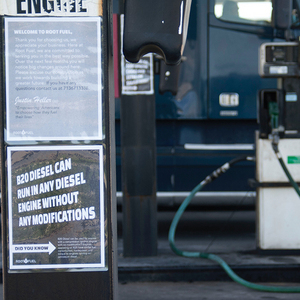Building the New Energy Economy

PHOTO: AKASH ENERGY INC.
July 18, 2014
BY Justin Heller
The stark reality of the economic, political and environmental impacts of our current petroleum-based society is so daunting that America seems to have turned a blind eye. Even worse, it appears that we have traded our ability to determine our own destiny for our individual short-term self-interests. Despite the latest assessment from the Intergovernmental Panel on Climate Change that warns climate change is happening faster than anyone projected, the U.S. EPA has proposed stalling the biodiesel mandate under the federal renewable fuel standard—even though the very same agency has determined that biodiesel reduces greenhouse gas emissions by 57 to 86 percent compared to fossil diesel.
Almost 10 years since the federal government helped commercialize the biodiesel industry, it appears we have been duped since the beginning. The coming and going of mandates and tax credits has boosted people up, only to knock them down. Now we are being further betrayed by an administration that ran on an agenda of renewable fuels that garnered my complete support. Joe Jobe, the CEO of the National Biodiesel Board, voiced this sentiment in a recent letter to the Obama administration: “You need to know that this decision would have lasting, damaging consequences for the jobs and economic activity supported by the U.S. biodiesel industry, while undermining your efforts to boost U.S. energy security through clean, domestic energy production.”
I have a vision of a new energy economy based on integrated production (which is starting to happen—see “Time Has Come Today,” Kotrba, May/June 2014 Biodiesel Magazine) and efficient distribution of a diverse fuel mix. This new energy economy makes economic sense first, as the more sustainable it is built, the cheaper the fuels become. The idea is to leverage drop-in alternatives such as biodiesel today while next-generation fuels for the advanced vehicles of tomorrow are developed; all while incrementally reducing our carbon emissions, creating energy security and unfathomable prosperity as more and more energy dollars stay in America, spawning unprecedented innovation.
In December 2012, with Anish Mashettiwar, a childhood friend and attorney, I founded Akash Energy to do my part in making this vision a reality. Through our retail division, Root Fuel, we have undertaken the mission of redefining America’s relationship with fuel—what I believe to be the most critical step in creating a new energy economy.
Advertisement
We started with no licenses, storage assets, supply or customers; we were forced to rely on the few relationships I had in Houston. We partnered up with everyone we could in the beginning to get access to supply and storage space. In the beginning of 2013, with the blenders credit recently reinstated, we were able to find distressed supply produced in 2012 and claim the credit on it. This enabled us to sell to downstream jobbers and significant discount to OPIS diesel prices, and still make 75 cents to $1 per gallon. Trading in this market, we quickly built up cash, and thus overhead.
In April 2013, we finally started tolling at a small plant in Louisiana. We were killing it in the beginning, making well over $1 per gallon. We had a solid RIN offtake and were able to get our tax credits financed, shortening our overall cash cycle. Unfortunately, things quickly took a turn for the worse. The feedstock tank at the plant we were tolling at exploded, shutting down that operation for two months. A few of our “partners” turned out to be crooks; one actually ended up in jail (for something he had done prior to us meeting him). We still had obligations to meet and were forced to buy product in the market, cutting our margin dramatically. The plant became operational again in July, and we had a few months of solid production. At this time, we had also identified the stations that would become Root Fuel’s first sites. With less than a year of financials, we had to go through the Small Business Administration to buy them. This was not an easy process, and we did not get approved until this June.
Advertisement
At the end of October, with the tax credit clearly coming to an end, we decided to liquidate our toll and sit on cash reserves. This is when things got really bad. The plant refused to release our remaining feedstock. Liquidated at the end of 2013 as biodiesel, it would have been worth close to $400,000.We finally just got it sold as off-spec feedstock. It had been contaminated, and we took a solid $120,000 hit. The efforts to get our feedstock out effectively killed our cash flow. In an effort to get cash flow going again, we leased our retail stations prior to having the loan in place. This helped initially, but got us into debt, as we did not manage our cash flow well. We had to lay off half of our team, and essentially rebuild from negative in today’s weak market. We fought on though, and our struggle is finally starting to pay off. We partnered with Western States Oil, a jobber based in San Jose, Calif., who supplies the cities of San Francisco and San Jose among many others. The company has been offering biodiesel since 1999 and has been a great source of inspiration and support for us.Our SBA loan also came through and we expect to begin building Root Fuel in July. With the SBA loan and the WSO partnership in place, the future is looking much brighter. It has been a brutal struggle, and there were many days when I thought we were not going to make it. The personal stakes were too high to quit, not mentioning the RVO proposal. We felt compelled to go on, as we truly believe that empowering the consumer at the retail level is essential for long-term viability of a new energy economy.
This vision can only become a reality if it is implemented successfully within the existing infrastructure. It must be put in place with minimal disruption to the status quo. It is a preposterous notion that overnight we can have a world where everyone has an electric car charged by solar panels. That may be where we ultimately end up, but it’s not for certain. I am certain though that the first objective is to empower the consumer with choice. If we draw from Economics 101, and assume that when a rational individual is presented with a choice, that individual will always choose what is in his or her best interest. Clearly consuming fossil fuels is not in our best interest, but we do it anyway. The only logical reasoning for this is an information gap and lack of choice.
Today’s fueling infrastructure is set up to not be questioned. The only concerns are cost and convenience. The ability to choose based on other merits is nonexistent (e.g., emissions profile, source, etc.). Even the integration of biofuels does not allow the consumer to make the conscious decision to use an alternative fuel. The average consumer does not have the opportunity to choose biodiesel or ethanol; it’s either blended or not. All that happens is a sticker is thrown on the pump that says “May contain up to X percent biodiesel or ethanol.” Think about the implications of the vagueness of that language. Think about the look and feel of those stickers; they subtly take away any semblance of control the consumer has over the decision of what fuels their motoring life.
Root Fuel intends to change the experience at the point of consumption. Our objective is to utilize the existing, relatively low-cost cardlock infrastructure, to create a completely new consumer fueling experience. We supply our stations through our upstream infrastructure at Akash Energy. Our goal is to create a user experience that changes the way the consumer thinks and feels about fuel. If we can successfully do this in Houston—in the belly of the beast—we can do it anywhere. Hopefully this will help spark the outright demand by the people for transportation fuels sold not just based on price and convenience, but on their overall impact on climate change as well as economic and political stability.By empowering the consumer through providing a better overall choice, we hope it will inspire a greater movement in the fight against climate change, and ensure the prosperity of our future. As our tag line will say, “Everything is possible.”
Author: Justin Heller
CEO, Akash Energy Inc.
281-954-4651
jheller@akashenergy.com
Related Stories
Montana Renewables LLC has delivered its first shipment of 7,000 gallons of SAF to Dearborn, Michigan's Buckeye Pipeline facility. From there, the fuel will be transported to the Detroit Metropolitan Airport via pipeline for use by Delta Air Lines.
NYC took a monumental step towards clean air and a sustainable future on Jan. 11 with the grand opening of the city's first retail fuel station dispensing renewable diesel. The project is a collaboration between Sprague and Sonomax.
The USDA on Jan. 11 awarded $19 million under the Higher Blend Infrastructure Incentive Program. The grants will support projects in 22 states to expand the availability of higher ethanol and biodiesel blends.
Jet Aviation partners with World Fuel Services to offer SAF in Bozeman, Montana, and Scottsdale, Arizona
Jet Aviation announced on Dec. 22 that it has signed an agreement with World Fuel Services to secure and offer sustainable aviation fuel (SAF) on-site at its FBOs in Bozeman, Montana, and Scottsdale, Arizona, effective immediately.
Neste has partnered with Coleman Oil Company, a leading provider of fuels, biofuels, lubricants, and related products, to enable cities and businesses to have easier access to Neste MY Renewable Diesel in the state of Washington in the U.S.
Upcoming Events










